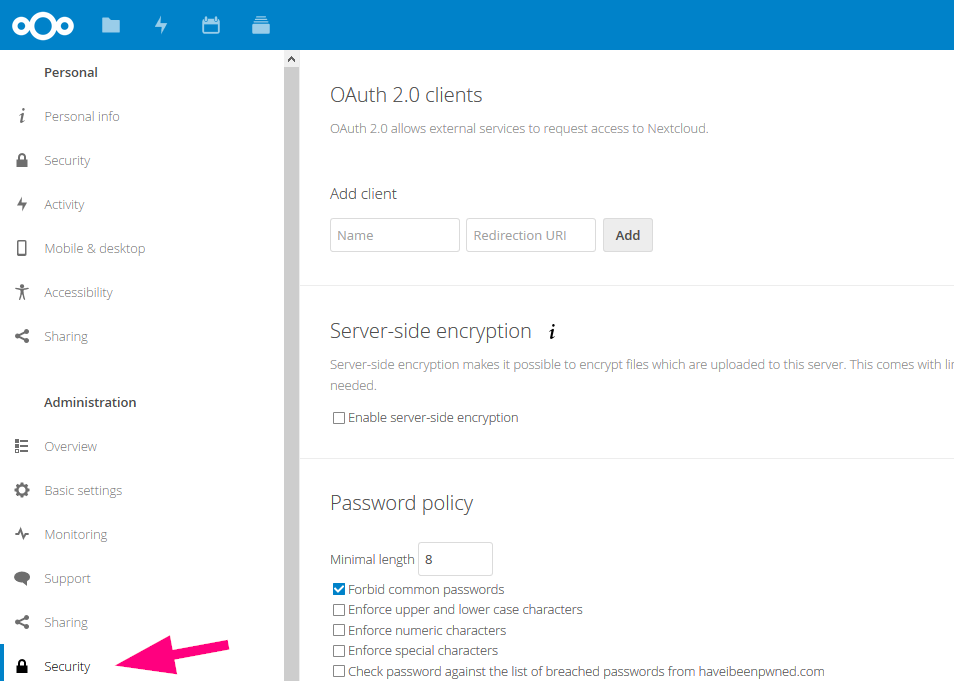Thanks to https://github.com/Clemens-Dautermann Signed-off-by: Philip Molares <philip.molares@udo.edu>
3.4 KiB
Authentication guide - Nextcloud (self-hosted)
This has been constructed using the Nextcloud OAuth2 Documentation combined with this issue comment on the nextcloud bugtracker .
This guide uses the generic OAuth2 module for compatibility with Nextcloud 13 and above (this guide has been tested successfully with Nextcloud 14 and Nextcloud 20).
-
Sign-in with an administrator account to your Nextcloud server
-
Navigate to the OAuth integration settings: Profile Icon (top right) --> Settings Then choose Security Settings from the Administration part of the list - Don't confuse this with Personal Security Settings, where you would change your personal password! At the top there's OAuth 2.0-Clients.

-
Add your HedgeDoc instance by giving it a name (perhaps HedgeDoc, but could be anything) and a Redirection-URI. The Redirection-URI will be
\<your-hedgedoc-url\>/auth/oauth2/callback. Click Add.

-
You'll now see a line containing a client identifier and a Secret.

-
That's it for Nextcloud, the rest is configured in your HedgeDoc
config.jsonor via theCMD_environment variables! -
Add the Client ID and Client Secret to your
config.jsonfile or pass them as environment variables. Make sure you also replace<your-nextcloud-domain>with the right domain name.
-
config.json:{ "production": { "oauth2": { "clientID": "ii4p1u3jz7dXXXXXXXXXXXXXXX", "clientSecret": "mqzzx6fydbXXXXXXXXXXXXXXXX", "authorizationURL": "https://<your-nextcloud-domain>/apps/oauth2/authorize", "tokenURL": "https://<your-nextcloud-domain>/apps/oauth2/api/v1/token", "userProfileURL": "https://<your-nextcloud-domain>/ocs/v2.php/cloud/user?format=json", "userProfileUsernameAttr": "ocs.data.id", "userProfileDisplayNameAttr": "ocs.data.display-name", "userProfileEmailAttr": "ocs.data.email" } } } -
environment variables:
CMD_OAUTH2_CLIENT_ID=ii4p1u3jz7dXXXXXXXXXXXXXXX CMD_OAUTH2_CLIENT_SECRET=mqzzx6fydbXXXXXXXXXXXXXXXX CMD_OAUTH2_AUTHORIZATION_URL=https://<your-nextcloud-domain>/apps/oauth2/authorize CMD_OAUTH2_TOKEN_URL=https://<your-nextcloud-domain>/apps/oauth2/api/v1/token CMD_OAUTH2_USER_PROFILE_URL=https://<your-nextcloud-domain>/ocs/v2.php/cloud/user?format=json CMD_OAUTH2_USER_PROFILE_USERNAME_ATTR=ocs.data.id CMD_OAUTH2_USER_PROFILE_DISPLAY_NAME_ATTR=ocs.data.display-name CMD_OAUTH2_USER_PROFILE_EMAIL_ATTR=ocs.data.email
!!! info
If you are using a CA not trusted by Node.js (like Let's Encrypt e.g) for your NextCloud instance you can set the NODE_EXTRA_CA_CERTS environment variable to the CA certificate file path of your CA.
Remember to also make the file available inside the Docker container, if you're running HedgeDoc in Docker container.